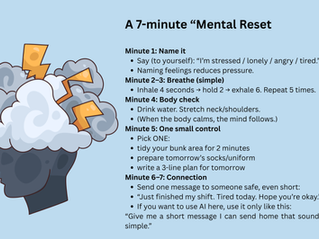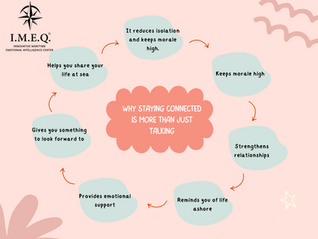What Does Diabetes Look Like at Sea? Let’s Talk About It.
- Nov 14, 2025
- 2 min read
Life at sea is demanding. And if you are living with diabetes, or trying to prevent it, the challenge can feel even greater.
But here is the truth: you are not alone, and your health matters.
This Day is About You
World Diabetes Day is not just about awareness, it is about recognition. Recognition of the effort it takes to stay healthy while working onboard. Recognition of the small choices you make every day, choosing water over soda, taking a walk on the deck after dinner, choosing a fruit over chocolate.
It is about your strength.
You deserve meals that do not just fill you up, but support your health and reflect your culture. Food is an enjoyment, and when is prepared with care, balanced, nourishing, and familiar, it becomes a quiet kind of support.
So, if you have ever asked for brown rice instead of white, or more vegetables on your plate, that is not a small thing. That is you taking charge.
Diabetes Does Not Define You
It is easy to feel like diabetes is a limitation. But it is not. It is a condition, one that many people manage successfully, even at sea. What matters most is knowing your body and making informed choices.
And if you are not diabetic? This is still your moment. Because prevention starts with awareness, and every healthy choice you make is a step toward protecting your future.
Let’s Talk About It
If you have ever felt unsure about what to eat, or worried about your sugar levels, or just wanted someone to listen, speak up. Talk to your crewmates. Ask questions. Share tips. You might be surprised how many others are navigating the same waters.
You are out there keeping the world moving, and that takes courage. This World Diabetes Day, take a moment for yourself. Reflect. Reset. And remember: your health is your anchor.
Quick Tips for Healthy Choices Onboard
Stay Hydrated
Choose water or unsweetened tea over sugary drinks.
Smart Snacking
Keep nuts, fruits, or yogurt handy instead of processed snacks. These help maintain steady blood sugar levels.
Balance Your Plate
Aim for half your plate to be vegetables, a quarter lean protein (fish, chicken, beans), and a quarter whole grains (brown rice, whole wheat bread).
Watch Portion Sizes
Try to avoid going back for seconds unless it is vegetables. Stick to the Harvard Healthy Eating Plate.

Move Regularly
Take short walks on deck after meals or do simple stretches in your cabin. Even 10 minutes makes a difference.
Plan Ahead
If you know the menu, choose options that are grilled, steamed, or baked rather than fried.
Limit Sugary Treats
Enjoy sweets occasionally, but pair them with protein (like yogurt or nuts) to reduce blood sugar spikes.

This article has been authored by Oceanic Health & Wellbeing Department, a team of nutrition and dietetics experts, as part of our commitment to enhancing crew wellbeing in the maritime industry.





































































































I was diagnosed with Parkinson’s disease four years ago. For over two years, I relied on Levodopa and several other medications, but unfortunately, the symptoms kept getting worse. The tremors became more noticeable, and my balance and mobility started to decline quickly. Last year, out of desperation and hope, I decided to try a herbal treatment program from NaturePath Herbal Clinic.Honestly, I was skeptical at first, but within a few months of starting the treatment, I began to notice real changes. My movements became smoother, the tremors subsided, and I felt steadier on my feet. Incredibly, I also regained much of my energy and confidence. It’s been a life-changing experience I feel more like myself again, better than I’ve felt…